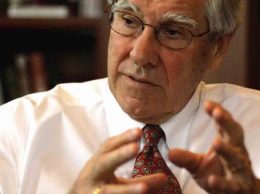It’s déjà vu for investment bankers
We’ve been there before. The movie “The Big Short” explains how and why the financial services industry helped to bring down our economy during 2007-08.
Banks took home mortgage loans that were made based on shaky credit and pooled them into a basket of mortgage-backed securities (MBS) that were backed by the homes. These were sold to unsuspecting investors including other financial institutions (think Lehman Brothers) that wanted to receive a steady stream of cash flows from mortgage payments. Little did they know the underlying assets were all-too-often worthless because they were based on subprime loans.
So the investors hedged their bets by finding a sucker to buy off the MBS through a collateralized debt obligation (CDO). Now, as the movie portrays, these investors grew nervous as some prognosticators preached doom and gloom causing the investors to approach other financial institutions (think AIG) to hedge their risk by betting against the very instruments they bought by acquiring credit default swaps (CDS). Confused? Go see the movie. It cleverly explains the process.
That was in the early 2000s as the stock market was booming and financial institutions became greedy, wanting higher and higher returns on their investments, even if it meant purchasing risky investments. Of course, some weren’t aware of the risk and some figured another financial institution would bail them out, as did JPMorgan Chase that bought out the failing Bear Stearns. Lehman wasn’t as lucky when the government drew a line in the sand as more and more financial institutions teetered on the edge of disaster.
Well, as the great Yogi Berra said: “It’s déjà vu all over again.” Along comes the “bespoke tranche opportunity,” which allows investors to place wagers on the outcome of various loans, bonds and securities in which they are not directly invested. “The “bespoke” version flips that CDO business dynamic around. An investor tells a bank what specific mixture of derivatives bets it wants to make, and the bank builds a customized product with just one tranche that meets the investor’s needs.
Bespoke CDOs are a relatively new instrument in the financial world. They allow investors to target very specific risk/return profiles for their investment strategies or hedging requirements. In reality, the arranger demands a good deal of input into the selection of the reference portfolio. Most investment managers control their risks by buying and selling protection on a single-name CDS or by linking losses to a corporate credit index like the CDX or iTraxx; therefore, they usually avoid taking positions in CDSs that cannot readily be traded.
A logical question is why would investment managers tread lightly in an area similar to one that has burned them before? The answer is that interest rates have been kept low by the Federal Reserve so investment banks are becoming impatient with not being able to make what they deem to be enough profit off corporate and Treasury bonds and, therefore, have started playing in the “financially structured product” game.
It goes deeper than that. Only one high-profile participant in the financial disaster has been sent to jail — Kareem Serageldin, an executive at Credit Suisse who once earned nearly $7 million a year. This has created a moral hazard effect where investment bankers now figure the worst that can happen if they cross the line is a financial penalty with no jail time. So why not jump into the choppy waters of structured financial instruments once again?
The financial crisis and its aftermath created a hole in the moral ozone that is supposed to serve as a check on excessive, risky behavior by investment bankers. It is a breach that, in my opinion, is irreparable absent any dramatic steps to better control the risk appetite of some in the financial services industry. This saddens me because the last thing we need is more government regulation. Unfortunately, it may be necessary because the very ethical standards that are supposed to protect the public under capitalism have broken down.
Adam Smith, in his iconic “The Wealth of Nations,” stated that “By pursuing his own interest he (the capitalist) frequently promotes that of the society more effectually than when he really intends to promote it.” His theory no longer describes the way our free market economy works and its breakdown explains, in part, the economic gap in our society.
• Steven Mintz is a professor in the Orfalea College of Business at Cal Poly San Luis Obispo.











